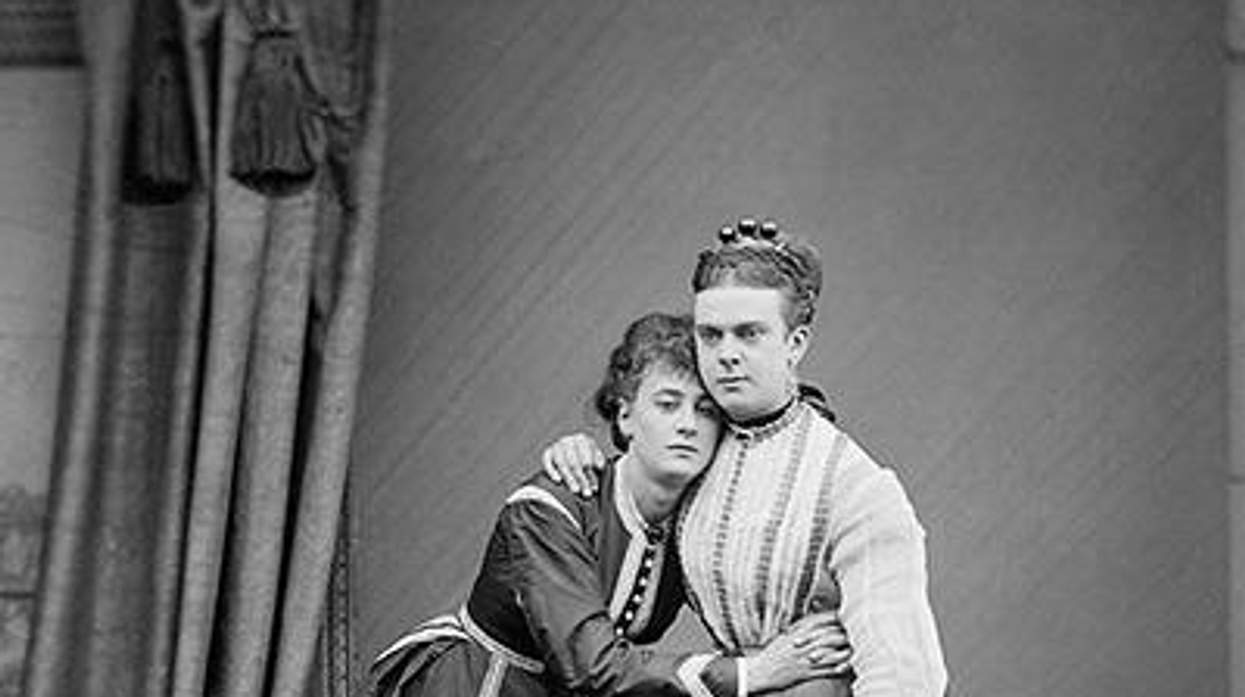Maybe you've heard of the pioneering trans* activists Fanny and Stella, who were charged for indecency in Victorian Britain 25 years before Oscar Wilde. Maybe you haven't? Up until the announcement of a new play based on their lives by writer Glenn Chandler -- appropriately named Fanny & Stella -- I certainly had not. Yet, reading about them, it has become clear how important they were, and how tragic it is that most of us probably don't know who they are.
Chandler's play is now being performed in London. It follows the story of cross-dressing gays Frederick Park and Ernest Boulton, a.k.a. Fanny and Stella, who were arrested in 1870 for wearing women's clothes to a play and charged with "conspiring to incite others to commit unnatural offences." After a trial that attracted huge publicity, the two were acquitted -- partly because doctors who inspected the men couldn't prove they had anal sex. Both Fanny and Stella, who performed throughout London in men's and women's clothing, hoped their success in court would be a catalyst for change in the antigay laws of the time (sadly, it wasn't).
The play is exciting. The retelling of queer history is important. Yet at the same time I cannot help but be disappointed at my lack of knowledge of these two pioneers as well as many others of their time. I suspect I am not the only one. When it comes to remembering queer history we're pretty bad at it.
I'm not talking here about our modern history. The stories of the past 40 years, from the Stonewall Riots to Harvey Milk to the AIDS crisis to the growth of the marriage equality movement, are largely imprinted on our collective memory. Yet that seems to be the limit of it. Queer history is often written as if it started June 28, 1969, the date of Stonewall.
Yet, our story goes much deeper than that. A quick look and you can find some amazing things. What about Oscar Wilde, who was not as lucky as Fanny and Stella, and was sentenced to hard labor for "gross indecency"? Or how about Magnus Hirschfeld, a gay, Jewish, left-wing occasional transvestite, who developed the Berlin Institute of Sexual Research in 1919? Hirschfeld had to flee Germany in the 1930s, watching as his entire library was set alight.
These sorts of stories run throughout our history. Stories of pioneers and campaigners, and of movements that changed our society for the better. Our history is far deeper and more varied than just what's happened in the last 40 years.
This is really important. Through pointing to the heroes and heroines of our past we can draw greater connections to our modern struggle. Just as Joan of Arc and the women of the suffragist movement have become important modern feminist icons, so should Fanny and Stella, Wilde and Hirschfeld (among many others!) become icons of the queer movement.
More than that, understanding this history is essential to ensuring the continued progression of LGBTIQ rights. In recent years we have begun to talk as though the march of queer liberation is "inevitable." But what if it wasn't as simple as that?
It is a little-known story that the Soviet Union -- now one of the most homophobic nations on earth -- was at the forefront of gay rights in the early 20th century. In the aftermath of the Russian Revolution, all offenses related to homosexuality were removed from the criminal code (well before this happened in much of the Western world). In fact, if you look even further into Russian history you will see a very tolerant approach to homosexuality. This is a very different picture from the one we see in Russia now. After a decade of sweeping changes for LGBT rights in developed nations, Russia turned quickly against queer people. Suddenly all the progress was lost.
Here is the true importance of understanding our history. If we see history only through the lens of the past 40 years in the U.S., it is easy to paint a picture of constant progress. It is why so many are bewildered by the actions of Russia -- how could a country turn on gays like this in the 21st century?
But if you take a longer view you realize our story is more complex. It is one of constant struggle -- a story of progress being followed by setbacks, only to be met with resistance once again. This is not to make us depressed about the gains we've made but to ensure we collectively protect ourselves from returning to this fate. If we understand our history better, we don't let ourselves lose the progress we've made.
Speaking about Fanny and Stella, playwright Glenn Chandler stated, "The sad thing is that they really thought their case would change things, they thought a change in the law was coming, but then in two decades we have the Oscar Wilde trial and it takes another two centuries for change to come."
Chandler points out that Victorian society actually became more conservative in the years following their trial. If Fanny and Stella's case was held in the era of Oscar Wilde, there is every chance they could have ended up behind bars. The progress they hoped for vanished before their eyes. We are making great progress, but the past shows us this can be reversed in a hearbeat. Knowing our history can help us stop that from happening.
















Charlie Kirk DID say stoning gay people was the 'perfect law' — and these other heinous quotes
These are some of his worst comments about LGBTQ+ people made by Charlie Kirk.